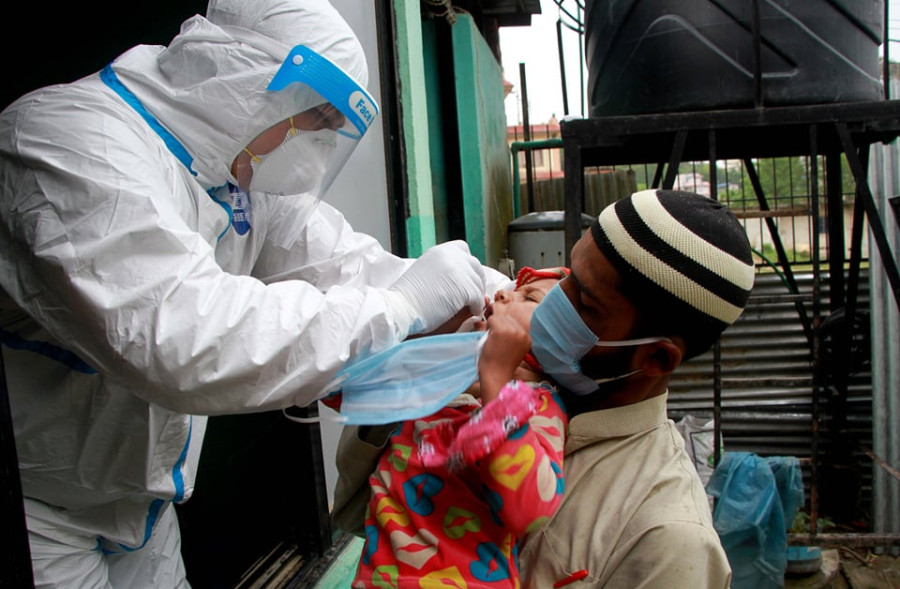Health
Public health experts suggest more PCR tests as they call into question the efficacy of rapid test kits
The Department of Health Services, however, bets on rapid test kits in the fight against coronavirus even though the National Public Health Laboratory says the validity of RDT kits was based on a small sample size.
Arjun Poudel
At a time when the government is working to perform more rapid tests for Covid-19, public health experts have warned that it will be a waste of public money and urged the government to focus on ramping up polymerase chain reaction tests instead.
They have questioned the efficacy of rapid diagnostic test (RDT) kits being used throughout the country and said that even if the test kits are reliable, they cannot be used for diagnostic purposes.
"Rapid diagnostic test kits can be used for study to know if the antibody has developed in the population against the disease," Dr Harischandra Upreti, former director at the National Public Health Laboratory, told the Post. "I am wondering why are we stressing more on rapid tests, when several countries and several states of India have stopped using rapid diagnostic test kits."
Several states of India have halted rapid tests including Rajasthan where only 5.4 percent of the tests proved effective.
An official at the Health Ministry said the rapid tests were rolled out after testing just four samples of positive patients—three in Kailali and one in Baglung.
"Of the four samples tested by the rapid diagnostic test kits, results of three were found accurate. One of the test results came negative," said the official who did not wish to be identified.
Dr Runa Jha, director at the National Public Health Laboratory, also admitted that the laboratory had submitted its report to the Health Ministry based on tests carried out on a few samples.
"I cannot tell you the number of tests we performed for validation,"Jha told the Post. "We have furnished the report on the test results to the Health Ministry."
Meanwhile, an official at Nepal Health Research Council, which is entrusted to perform the test validity, said that the council was unaware about the results of rapid tests being carried out across the country.
“We do not have any idea about what is happening,”Dr Megnath Dhimal, chief of council, told the Post.
As of Sunday, over 43,ooo rapid tests had been performed throughout the country, according to the Health Ministry.
The government is procuring 100,000 RDT kits through a fast track procedure. Earlier, the ministry had purchased 75,000 kits for $600,000.
Dr Mingmar Gyelgen Sherpa, former director at the Department of Health services, said rapid tests do not mitigate the risk of possible transmission.
"Due to more focus on rapid tests, we are not performing polymerase chain reaction (PCR) tests, which give more accurate results," he said. "Both the number and capacity of laboratories having polymerase chain test facilities should be increased."
Rapid tests give misleading results like in Udayapur where the people residing in a mosque tested negative in rapid tests, only to later test positive when they underwent PCR tests.
There was also the incident in Kailali where a 65-year-old woman, who was allowed to go home after spending two weeks in quarantine based on her negative rapid test results. She later tested positive for the novel coronavirus in a polymerase test.
Dr Sherpa has suggested that the government look into other reliable options instead of rapid tests.
"Earlier, we did not have more options like we have at the present, " he said. “We should not spend money on rapid test kits just for the sake of testing."
Mahendra Prasad Shrestha, director general at the Department of Health Services, however, claimed that the ongoing rapid tests have been yielding accurate results. He went on to say rapid tests are not only reliable but also the only option to stop the risk of Covid 19.
"Polymerase chain reaction is very costly and each test costs Rs 15,000," Shrestha said. "We cannot afford more such tests so we are performing rapid tests."




 13.12°C Kathmandu
13.12°C Kathmandu














